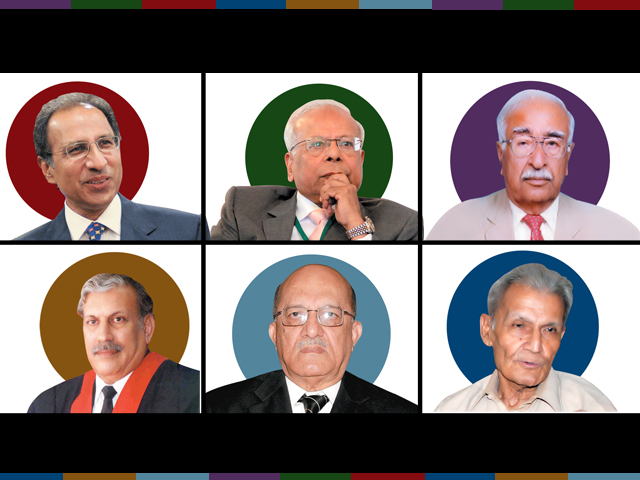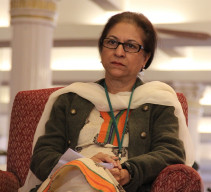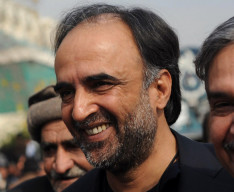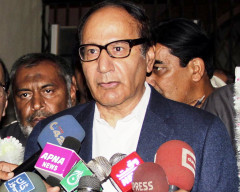
Government nominees
Hafeez Shaikh – a bipartisan choice?
An economist of international repute, Dr Abdul Hafeez Shaikh, 58, is a popular pick on the government’s list of three nominees for caretaker prime minister as assemblies roll back on March 16 making way for an interim setup. Born in 1955, Shaikh holds a PhD in economics from Boston University. Having worked at Harvard Institute of Development and assumed key offices at the World Bank, Shaikh has 30 years of elaborate experience under his belt in areas of economic policymaking, management and implementation. During General Pervez Musharraf’s era, Shaikh assumed offices in both the Sindh and federal governments. After General Musharraf declared himself President, Shaikh was appointed Minister for Finance, Planning and Development for Sindh. Sporting a successful tenure from 2000-2002, Shaikh is esteemed to be the architect of Sindh’s financial recovery. He has been elected as Senator thrice. Shaikh’s three years as the Federal Minister for Privatisation and Investment were considered most successful in Pakistan’s history. His last assignment in the present government was as the Federal Minister for Finance, Revenue, Economic Affairs, Statistics and Planning and Development. Though Shaikh remained finance minister between 2010 and 2013, he was unsuccessful in steering the economy out of crisis. Due to this, he has been bitterly criticised by the Opposition. However, his association with Opposition Leader in the Senate, Ishaq Dar, is said to be one of the reasons, along with the military establishment’s backing, that compelled the key opposition to support him for the prestigious post.
(With reporting from Shahbaz Rana in Islamabad)
Dr Ishrat Husain – the non-political candidate
Ishrat Husain’s nomination for interim prime minister comes as somewhat of a surprise, since he has previously held no political office. Husain is currently the dean and director of the Institute of Business Administration in Karachi, the oldest business school in Asia and Pakistan’s closest equivalent to Wharton. But he is perhaps best known for his stint as the Governor of the State Bank of Pakistan, a position in which he served from 1999 to 2006, making him one of just three out of the 18 heads of the central bank who have served a full seven years in office. Husain’s tenure at the SBP is widely remembered as one of significant monetary policy stability. Under his stewardship, the process of bank privatisation that began under the first administration of Nawaz Sharif was largely completed, with the privatisation of Habib Bank being completed shortly after he left office. Before he came into office, the majority of Pakistan’s banking sector assets were in state-owned banks. By the time he left, the overwhelming bulk was in privately-owned banks. Husain began his career in 1964 as a civil servant, working at several positions within the finance ministry and the Planning Commission. He completed a masters degree in development economics in 1972 at Williams College. In 1976, he was accepted to the PhD programme in economics at Boston University, which he completed at an unusually quick pace of just two years. Following his doctorate, Husain took up a position at the World Bank, where he served in several senior positions, including director for the Central Asian Republics, chief economist for Africa, and chief economist for East Asia and the Pacific.
(With reporting from Our Correpondent in Karachi)
Justice (retd) Mir Hazar Khosa – living up to his title
A venerated officer, bearing a reputation of honesty, Justice (retd) Mir Hazar Khan Khosa, 84, hails from the Goth Azam Khan Khosa in Jaffarabad district of Balochistan. Nominated by the ruling party, his first political appointment came as the Acting Governor of Balochistan – an office he kept for three months after the death of Governor Muhammad Musa, who served as the 10th governor of the province from December 17, 1985 to March 12, 1991. Earlier, having served as judge of the Balochistan High Court, Khosa was promoted to assume the position of Chief Justice of Balochistan High Court for a tenure spanning from 1990 to 1991. As a judicial officer, Khosa never indulged in any controversy and kept himself away from politics and while being a judge in the superior courts. Owing to the respect and trust he enjoyed from Baloch nationalist leaders and separatist elements of Balochistan, the ruling party considers him invaluable in bringing disgruntled elements to unity. After retiring from the provincial court in September 1991, Khosa took up the office of Judge of the Federal Shariat Court. After a few years of diligent service, in 1994, Khosa was promoted as Chief Justice of the Federal Shariat Court. Because of his clean reputation, Khosa currently serves as the Balochistan Chairman of the Zakat Council, a position that demands both uprightness and responsibility. This is a testimony to Khosa’s wide popularity among the leadership of Balochistan. Since long, Khosa has steered clear from politics, focusing mainly to his Zakat Council job. However, he is active as an agriculturist in his town Subatpur. Recently, his son, Advocate Amjad Khan Khosa, is reported to have joined the Pakistan Tehreek-e-Insaf. His other son, Mehrab Khan Khoso, was elected as an MPA of Balochistan Assembly on the ticket of Pakistan Peoples Party in 2008.
(With reporting from Mohammad Zafar in Quetta)

Opposition nominees
Justice (retd) Nasir Aslam Zahid – champion of rights
If justice had a face and a heart, it would resemble that of Justice (retd) Nasir Aslam Zahid. As the opposition’s nominee for the interim prime minister, Justice Nasir has been a robust defender of people’s rights and one of the most respected names of the country’s superior judiciary. Son of the first governor of the State Bank of Pakistan Zahid Hussain, Justice Nasir has held key posts during his career. He was chief justice of the Sindh High Court and was then elevated to the position of a judge in the Federal Shariat Court. Justice Nasir completed his matriculation from Karachi’s St Patrick’s High School and graduated from Government College in Lahore. He is also an alumnus of the University of Cambridge. In 1956, Justice Nasir was called to the bar and was elevated 24 years later as an additional judge of the Sindh High Court (SHC) on May 17, 1980. In 1988, he was temporarily removed from office by the Pakistan Peoples Party’s government, which sent him off on deputation as the federal law secretary, a post he held until June 1990 when he returned to the SHC. As a staunch believer in principles, Justice Nasir chose to step down from the bench of the Supreme Court after he had taken oath under the Provisional Constitution Order imposed by General Pervez Musharraf. Since his retirement, he has spent much of his time spearheading the cause of women’s rights.
(With reporting from Naeem Sahoutara in Karachi)
Justice (retd) Shakirullah Jan – man of ‘speed justice’
Born just four days after Pakistan’s creation, Shakirullah Jan has held multifarious caretaker offices: he remained acting chief of the Election Commission of Pakistan in March 2012 and the acting chief justice of Supreme Court in the absence of the Chief Justice Iftikhar Muhammad Chaudhry in May 2012. After graduating from the Islamia College Peshawar, bearing a degree in law, Jan joined the Bar in 1973. He enrolled as an advocate of the High Court in 1975, and that of the Supreme Court in 1980. Jan was raised to the rank of a judge at the Peshawar High Court (PHC) and in 1993-1994, he was unanimously elected as the member of the executive committee of the Supreme Court Bar Association. He brought down 1,700 pending cases after he was appointed Chief Justice of the Peshawar High Court. In 1989 to 1993 he served as the chairman of the free legal aid committee of the bar council and ranked as a judge of the Peshawar High Court in 1995. Despite his judicial appointment, Jan remained connected with the academia at various levels. He served as visiting lecturer on various law subjects in the then North West Frontier Provinces Provincial Services Academy, Peshawar, as a part-time lecturer at the Frontier Law College, Peshawar and was also engaged with the Shariah Academy of International Islamic University, Islamabad in 1991. The retired judge also begot revolutionary changes to judiciary. Furthermore, the Criminal Justice Co-Ordination Committee and the Bench Bar Liaison Committee were administrated in his tenure. In order to ascertain speedy delivery of justice, Jan also introduced regular monthly meetings of judicial officers of various districts.
(With reporting from Our Correspondent in Peshawar)
Rasool Bux Palijo – a rebel with a cause
The 83-year-old Marxist-nationalist leader, Rasool Bux Palijo, is a constitutional and criminal lawyer. His political career spans over six decades, yet he has never been on the forefront of power. Palijo founded the Awami Tehreek in 1970. It was recently re-named Qaumi Awami Tehreek and is presently led by his son Ayaz Palijo. The party is a member of the 10-party bloc in Sindh – led by Pakistan Muslim League-Nawaz and Pakistan Muslim League-Functional – against the ruling Pakistan Peoples Party. Palijo is also a founding member of the Awami National Party, Pakistan Oppressed Nations Movement, Sindh Qaumi Ittehad, Bazm-e-Sufia-e-Sindh and Sindhi Adabi Sangat. He spent approximately 11 years in prison at various times during Ayub Khan and Ziaul Haq’s military dictatorships. Palijo was declared a prisoner of conscience by Amnesty International in 1981. It was Palijo’s resistance to martial law, feudalism, colonialism and imperialism that kick-started his activism. He was a part of the Movement for the Restoration of Democracy, One Unit system and against the construction of Kalabagh dam and Thall canal that put a rebellious flavour to Palijo’s political career. He also strongly opposed military operations in Bangladesh and Balochistan. A literature, history and philosophy fanatic, Palijo is credited with setting up unique trends in educating political workers. The Awami Tehreek’s student wings are famous for holding peaceful demonstrations at academic institutions, unlike their nationalist counterparts. Born on February 21, 1930 in Thatta, he is the elder of the family of Sindh Culture Minister Sassui Palijo. He obtained his LLB degree from Sindh Law College in 1949. His late wife, Zareena Baloch, was a famous folk singer who worked for the cause of women’s education. Expressing confidence that his father will be able to oversee free, fair and transparent elections in the country, President Qaumi Awami Tehreek Ayaz Palijo told The Express Tribune: “All his life he has only struggled for the socio-political rights of the people. Ensuring fair elections, in which the people elect a good leadership, will be an achievement [for him].”
(With reporting from Z Ali in Hyderabad)

Total Voters: 823 Poll results reflect the views of a sample of visitors to The Express Tribune website.
Published in The Express Tribune, March 15th, 2013.
COMMENTS (34)
Comments are moderated and generally will be posted if they are on-topic and not abusive.
For more information, please see our Comments FAQ





















1714029027-0/Tribune-Collage-Feature-Images-(11)1714029027-0-270x192.webp)
1714027629-0/Ranbirtransformation-(1)1714027629-0-270x192.webp)






















Look at the photos--what a sad, pathetic lot!
Rasool Bux Palijo is more suitable in all. He is seasoned politician and up right human.
Rasool Bux Palijo shall be the best choice for free and fair elections. He has the best vision to built a real "Quaid-e-Azam Ka Pakistan" where women and minorities will remain on equal basis.
For three months we need a good strong and impartial administarator more than a good but weak economic advisor. All nominees are reasonable but Aslam Zahid fits the bill at this time.
If we move out two former world bankers (with probably some US support) and three judges (considering judicial activism these days) the only reasonable and somewhat independent choice is Rasool Bux Palijo, I believe.
Well, who else than Dr. Ishrat Hussain - an established achiever for Pakistan, and of Pakistan!
@Haroon: BB worked hard for the party. Statesperson of her caliber do not exist.
No one in Pakistan who has background of IMF world Banks and other such WESTERN Institutions , ( which some consider as educated types), shoild be allowed to mess up Pakistan in ANY position. Other nominees have Shariah, justice, madressa and such backgrounds and have their feet firmly planted in the soil, heads in tune with our glorious and civilized 90% awaam, and hearts in unison with Islam and muslims. It is they we need; not the westoxicated wharton-pride riffraff
@John:
Presidents: Ayub Khan and Gulam Ishaq Khan (Pashtun) Farooq Leghari and current president who is from Zardari Baluch tribe born in Sindh.
To some extent Yahya Khan (can also be included as Iranic based on his Qazilbash background, although born in Punjab)
Prime Ministers: Mir Zafar Ullah Jamali (Prime Minister) and Balakh Sher Mazari (Prime Ministers from Baluchistan). also Gulam Mustafa Jatoi (Jatoi Baluch tribe, born in Sindh). Mr Mazari and Jatoi have been In term/caretaker PMs.
On side note, Baluch Governors of Punjab: Latif Khosa current Governor and Zulfiqar Khosa Former governor (khosa Baluch tribe, spread along Baluchistan, Sindh and southern Punjab)
Baluch and Pashtun together make total of about 20% of Pakistan's population. Their representation at these top two offices is proportional.
My vote goes to Dr. Ishrat Hussain
Not just the caretaker PM, but I want Dr Ishrat Hussain to get elected as a Prime Minister. He can really turn things around.
In Pakistan, it is hard for a person of Iranic heritage like a Baluch or a Pashtun to be appointed to an important position such as president or PM. So the two chief justices from KP and Baluchistan have no chance. Pakistan is being completely dominated by the culture and politics of Indic/Vedic regions east of Indus.
Rasool bux palijo should be empowered to hold free and fair elections.
Ishrat Husain is a diamond!
ET!.There must be an option for disliking comments!
Justice Nasir Aslam Zahid also took oath under General Zia ul Haq's PCO in 1981.
My vote goes for Dr. Ishrat Husain because of his successful experience in handling economic and financial problems confronting us.
My vote goes for Dr. ishrat Husain
Some one from the LAW side we need speed justice to see Fair & Transparent under proper Law & Order .The matter is to see a free & fair election in Pakistan for that we do not need Economic managers or Politician .All we need some one suitable for this job but he must be from Justice side like Justic (retd ) Shakirullah Jan who is a man of 'speed justice' As from the rule book one must be from the (LAW ) side for such Jobs like caretaker PM on must know his or her country Law & rules .Or any one from the Law side is must to know by the books of rule & law.
It is just taking care, nothing new. Just keep the boat on the rocks.
I thin the prevailing circumstances demand that an economist is chosen as PM. Dr. Ishrat is the ideal one since he has done reforms successfully at SBP and IBA.
There is no competition. Rasool Bux Palijo it is In fact I wish we could have him as a PM and not just an interim PM.
Rasool Bux Palijo sahab can be a best choice. Otherwise, no hope. We don't need economic managers. We need people with impeccable integrity who spent their whole life in struggle for the people of Pakistan.
Justice (retd) Shakirullah Jan – man of ‘speed justice’
I am sure the two ex-world bank employees will have USAs backing as they would ensure that we do not stray from their dictated policies.
@Mahar: Well said. Absolutely right, if caretaker PM is not Rasool Bux Palijo/ Dr. Ishrat Hussain, then forget fair election. The attitude of these two personnel towards their professionalism is inspiring and therefore can be trusted.
Indeed Democracy is the BEST REVENGE :) This time our so called DEMOCRATIC GOVT. took revenge from COMMON PEOPLE.. Anyways if caretaker PM is not Rasool Bux Palio/ Dr. Ishrat saheb than forget Free and Fair Elections...
@Adnan Waqar: I'm surprised at you. Perhaps you don't know these parties very well.
My highest recommendation is for Dr. Ishrat Hussain.
No offense to anyone but I really think that Dr Ishrat Hussain is the bast choice among all candidates. This is because he has a reputation of being a good economic manager and an administrator during his tenure in the State Bank of Pakistan as well as in the World Bank.
It's not about Male / Female ... It's about someone suitable for the Job.
At the moment, the best suited nominee amongst these is Rasool Bux Palijo, because his career is well aligned with what we are expecting from a caretaker setup, a fair and transparent elections.
After Benazir Bhutto, can we ever expect a female to become the Prime Minister of Pakistan. I am surprised that the Pakistan People's Party could not come up with any female candidates for the post. In fact I am surprised at both parties.